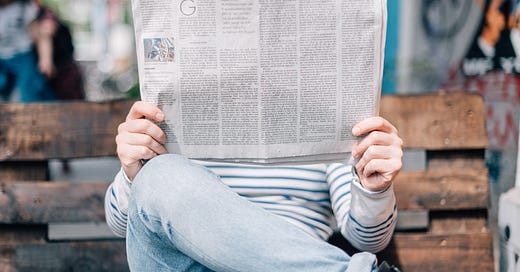Classical Education News & Articles | December 2022
In addition to reviewing books, ClassicalEd Review provides our readers with a monthly compendium of recent articles and news stories related to classical education and the liberal arts.
The Virtue of Noticing
by L.M. Sacasas
Few questions, it seems, are more important for us to consider at present than this: What does it mean to be human? But it is a perennial question, asked by thoughtful people for ages and answered in diverse and conflicting ways. The stakes have always been high, and no single answer can be taken for granted. In our time the question has centred at least in part on the possibility of fundamentally transforming the human being by the application of human knowledge and power. Indeed, it is not uncommon to encounter explicit calls for a post-human future, one in which the human condition is radically altered or altogether transcended.
Old Rules & Fresh Tips on Educating the Young
by Andrew Zwerneman
In a recent article about the lost greatness of Jesuit education in America, I came across a reference to a kind of playbook that once prevailed in Jesuit schools and universities, the Ratio Studiorum. Several hundred years old, this historical document is packed with useful tips for teachers and school leaders. The entire document is worth reading, but here are 7 takeaways particularly worth noting:
A Classical Education Demands a Classical Home
by Joshua Gibbs
If classical education were mainly concerned with students knowing what is right, then whatever took place in the life of the student between 3pm and bedtime would not matter so much. For all their faults, video games, pop music, and social media are not likely to scrub the memory. However, a classical education is more concerned with loving what is right than merely knowing it, and the culture and customs which are consumed and conducted after school can either strengthen the work of teachers, or simply blot it out.
The Burden of Youth
by Elizabeth Stice
It is hard to assess the health of today’s young people. They are less likely to smoke or drink or get pregnant than their parents were at their age. Girls play more sports than 50 years ago and women’s sports are becoming more popular. Young people have benefited from the decline in divorce. Counter to jeremiads, fathers are actually more involved with their children than they used to be.
Why Homer Still Matters
by Andrew Kern
Somewhere close to 750 B.C., Homer’s Iliad and Odyssey launched the ancient Hellenes on the voyage-battle that became the Greek miracle. Like no other literature apart from the Bible, his epics continue to form culture and transform souls.
Sound a Liberal Arts Revolution
by Scott J. Bloch
It’s time to get radical on campuses everywhere. I mean radical, as in a return to roots. There has been enough of the pulling up of roots in so-called higher education. We are enervated; many are disgusted, having given up on liberal arts education altogether. Unwittingly, are we also giving up on the best that Western Civilization has to offer?
Entrepreneurship and Classical Education
by Winston Brady
Classical education is a brand founded on the great books and the great ideas of the Western canon. These ideas naturally support the ideals of entrepreneurship in a way few schools do. Even among other classical schools, a movement that has grown all the more popular post-covid, there is rarely the same emphasis on business formation: the focus is on the past and not necessarily on the future and ways of improving that future through hard work and new products.
The Case for Classical P.E.
by Jenny Crockett
A more classical PE? Can we really apply the classical model that we use in the classroom to physical education? Absolutely! Children today need the “lost tools” of a physical education more than ever. Physical literacy, understanding how and why the human body works and how it was created to move, is a vital skill that has been lost. PE classes and time have been drastically diminished for students as they get older. The result has been a fourfold jump in the obesity rate among teens ages 12-19, from 5% in 1980 to 20.6% currently.
The Burden of Tradition
by Fr. Joseph Scolaro
Of all the wonders in the city of Rome, the Borghese Gallery is perhaps the most underappreciated. Outside the city walls to the north, it is tucked into a beautiful garden, and houses a smaller but impressive collection of art that once belonged to the 17th century Cardinal Scipione Borghese, nephew of Pope Paul V.
The Hobbit and Virtue
by Joseph Pearce
At its deepest level of meaning, The Hobbit is a pilgrimage of grace in which its protagonist, Bilbo Baggins, becomes grown-up in the most important sense. Throughout the course of his adventure, the hobbit develops the habit of virtue and grows in sanctity, illustrating the priceless truth that we only become wise men (homo sapiens) when we realize that we are pilgrims on a purposeful journey through life (homo viator).
Why Choose Mystery Over Ideology?
by Margarita Mooney Suarez
When I took a wrong turn while driving with students in Rhode Island in the summer of 2019, we found ourselves driving over a bridge clouded in fog, seemingly going into nowhere. When we came out of the fog, I tried to make a U-turn and ended up going around several jughandles before getting back on the same foggy bridge going the other direction.


